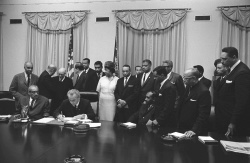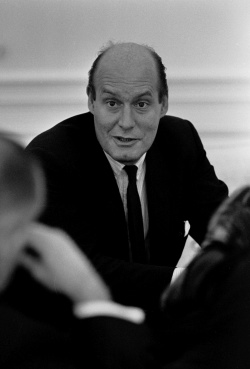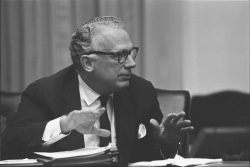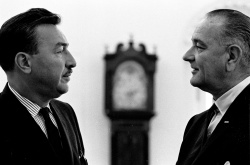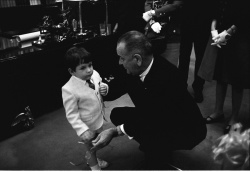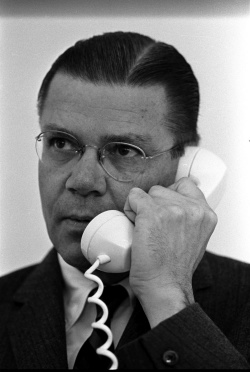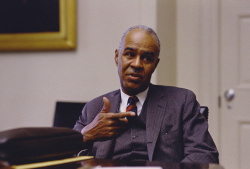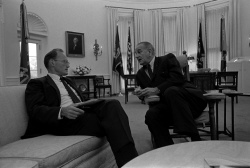1st2nd3rd4th5th6th7th8th9th10th11th12th13th14th15th16th17th18th19th20th21st22nd23rd24th25th26th27th28th29th30th
April 1st
On this day in 1965, President Johnson sent a letter to the President of the Senate and the Speaker of the House on the need for a new Chancery in Saigon.
This new building will be one more symbol of our solidarity with the people of Viet-Nam. It will show them that the United States has no intention of abandoning them in the face of Communist terrorism and aggression. It will show them that we intend to live up to our commitments.
This new building will also show the Communists in Hanoi and their tools in the Viet Cong that wanton murder of civilians and destruction of civilian property cannot deflect us from our stated purposes in Viet-Nam.
On this day in 1965, President Johnson made remarks at a ceremony in observance of Cancer Control Month. LBJ stated,
“It is quite appropriate, I think, that we begin the observance by issuing this Crusade Against Cancer stamp. This stamp will remind us of the efforts being made to eradicate this ancient enemy of mankind which takes so many lives from us each year.
…
“This year, 850,000 Americans will be under medical care for cancer. About 295,000 will die from it—that is one every 2 minutes. Over the years, cancer will strike in approximately two of three American families.
…
“I think our tasks are many. First, we must find cures for some diseases. We must prevent or eliminate others. We must make all citizens and all mankind the beneficiaries of this knowledge and this progress.
“So our task is cut out for us.”
April 2nd
On this day in 1965, President Johnson issued Proclamation 3651 - National Safe Boating Week, LBJ said,
“Whereas the Congress of the United States, in seeking to focus national attention on the importance of safe boating practices, by a joint resolution, approved June 4, 1958 (72 Stat. 179), has requested the President to proclaim annually the week which includes July Fourth as National Safe Boating Week.”
On this day in 1968, President Johnson gave a message to the Congress Transmitting Annual Report on Communications Satellite Activities. LBJ stated,
“The Communications Satellite Act of 1962 requires that the President transmit to the Congress an annual report on the activities and accomplishments of the past year.
“This is the fifth annual report under this landmark legislation. It reflects, as did the others, steady progress toward the ultimate goal of providing mankind with new capabilities for worldwide communication.”
April 3rd
On this day in 1964, President Johnson restored diplomatic relations with Panama through renegotiations of the Panama Canal Treaty and made remarks at the White House.
“Arrival of this agreement in the presence of understandable but intense emotions and convictions is a tribute to our essential unity of interest. We share much history. We, share a commitment to the liberty that we have achieved in the past and to the progress that we intend for the future. We can now proceed not only to solve today’s difficulties but toward the increased welfare of all the people of the Americas under the Alliance for Progress.
“So, gentlemen, let us approach our search for a solution with the openness and the generosity of those who seek only the strengthening of friendship. Let us meet as sovereign nations, as allies, and as equal partners in the inter-American system.
“Panama can be confident, as we are confident, that we each desire an agreement which protects the interests and recognizes the needs of both our nations.
“I would also like on this occasion to especially and particularly thank the OAS (Organization for American States) for its very important role. This is further proof of the unmatched effectiveness of the inter-American system. For decades disputes between the American nations have been settled at the conference table. This achievement in this hemisphere offers a hopeful model for all those who pursue peace in every continent. This is truly a great day for America, for Panama, for all the people of the Western Hemisphere, and for all freedom-loving people everywhere.”
On this day in 1964, President Johnson made remarks at the White House on the 15th anniversary of the signing of the North Atlantic Treaty.
“We believe in the alliance because in our own interest we must, because in the common interest it works, and because in the world’s interest it is right.
“We have other duties and opportunities. Our trade with one another and the world is not yet free and not yet broad enough to serve both us and others as it should. Our monetary systems have grown stronger, but they still too often limit us when they should be, instead, a source of energy and growth.
“In ever growing measure we have set ourselves and others free from the burden of colonialism. We have also set new precedents of generous concern for those that are less prosperous than we. But our connection to the less developed nations is not yet what it should be, and must be. This is not a one-way street, but we must work to do our full part to make it straight and to make it broad.
“We remain vigilant in defending our liberties, but we must be alert to any hope of stable settlement with those who have made vigilance necessary and essential. In particular we must be alive to the new spirit of diversity that is now abroad in Eastern Europe. We did not make the Iron Curtain. We did not build the Wall. Gaps in the Curtain are welcome, and so are holes in the Wall, whenever they are not hedged by traps. We continue to believe that the peace of all Europe requires the reunification of the German people in freedom. We will be firm, but we will always be fair. Our guard is up, but our hand is out.
“We must build on our tradition of determined support for the great United Nations. We are pledged to this purpose by the very articles of our treaty, and we have kept our pledge. The members of NATO provide most of the resources of the United Nations, and most of its ability to help in keeping peace. When we began we promised that our treaty was consistent with the charter. Today we know that the charter and the treaty are indispensable to one another. Neither can keep the peace alone. We need them both, in full effectiveness, for as many years ahead as any of us can see.
“The Atlantic peoples have a magnificent history, but they have known too much war. It is the splendor of this great alliance that in keeping peace with its opponents, it has kept the road clear for a worldwide upward march toward the good life for free people. Proven in danger, strengthened in freedom, and resolute in purpose, we will go on, with God’s help, to serve not only our own people, but to serve the bright future of all mankind.”
On this day in 1965, President Johnson met with Prime Minister Lester Pearson of Canada at Camp David, Maryland.
On this day in 1967, President Johnson met with President Cevdet Sunay of Turkey at the White House. That evening, the Opera Company of Boston performed Voyage to the Moon at a state dinner.
April 4th
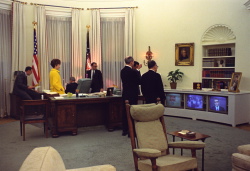 President Lyndon B. Johnson and members of his staff watch TV news reports concerning the assassination of Dr. Martin Luther King
President Lyndon B. Johnson and members of his staff watch TV news reports concerning the assassination of Dr. Martin Luther Kingcredit: Mike Geissinger
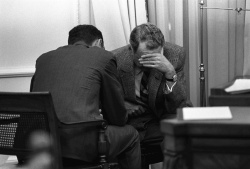 President Lyndon B. Johnson and members of his staff react to the news of Martin Luther King Jr.'s assassination
President Lyndon B. Johnson and members of his staff react to the news of Martin Luther King Jr.'s assassinationcredit: Mike Geissinger
On this day in 1968, President Johnson, in a brief television statement, deplored the “brutal slaying” of the Rev. Martin Luther King, Jr., and asked every citizen to “reject the blind violence that has struck Dr. King, who lived by nonviolence.” He proclaimed Sunday, April 7, as a national day of mourning for the Nobel Peace Prize winner and civil rights leader.
“America is shocked and saddened by the brutal slaying tonight of Dr. Martin Luther King.
“I ask every citizen to reject the blind violence that has struck Dr. King, who lived by nonviolence.
“I pray that his family can find comfort in the memory of all he tried to do for the land he loved so well.
“I have just conveyed the sympathy of Mrs. Johnson and myself to his widow, Mrs. King.
“I know that every American of good will joins me in mourning the death of this outstanding leader and in praying for peace and understanding throughout this land.
“We can achieve nothing by lawlessness and divisiveness among the American people. It is only by joining together and only by working together that we can continue to move toward equality and fulfillment for all of our people.
“I hope that all Americans tonight will search their hearts as they ponder this most tragic incident.”
Dr. King was killed by a sniper's bullet in Memphis, Tennessee. His killer, James Earl Ray, was arrested at an airport in London, England, June 8. Ray pleaded guilty to the murder in Memphis, March 10, 1969, and was sentenced to 99 years in prison.
April 5th
On this day in 1968, President Johnson met with civil rights leaders to discuss the assassination of the Rev. Martin Luther King, Jr.
Around noon; the President attended a memorial service for Dr. King at the National Cathedral. After returning the White House, Johnson delivered a televised address to the nation proclaiming Sunday, April 7, as a day mourning.
“Once again, the heart of America is heavy—the spirit of America weeps—for a tragedy that denies the very meaning of our land.
“The life of a man who symbolized the freedom and faith of America has been taken. But it is the fiber and the fabric of the Republic that is being tested.
“If we are to have the America that we mean to have, all men—of all races, all regions, all religions—must stand their ground to deny violence its victory in this sorrowful time and in all times to come.
“Last evening, after receiving the terrible news of Dr. King's death, my heart went out to his family and to his people—especially to the young Americans who, I know, must sometimes wonder if they are to be denied a fullness of life because of the color of their skin. I called the leaders of the Negro community and the white communities, the judiciary, the legislative and the executive branches of our National Government, and the leaders of our city halls throughout the Nation, throughout the night, and asked them to come here to the White House and meet with me this morning. We have been meeting together this morning.
“No words of ours—and no words of mine—can fill the void of the eloquent voice that has been stilled.
“But this I do believe deeply:
“The dream of Dr. Martin Luther King, Jr., has not died with him. Men who are white—men who are black—must and will now join together as never in the past to let all the forces of divisiveness know that America shall not be ruled by the bullet, but only by the ballot of free and of just men. In these years, we have moved toward opening the way of hope and opportunity and justice in this country. We have rolled away some of the stones of inaction, of indifference, and of injustice.
“Our work is not yet done. But we have begun.
“We must move with urgency, with resolve, and with new energy in the Congress, in the courts, in the White House, the statehouses and the city halls of the Nation, wherever there is leadership—political leadership, leadership in the churches, in the homes, in the schools, in the institutions of higher learning—until we do overcome.
…
“I did not understate the case last Sunday evening when I talked of the divisiveness that was tearing this Nation apart. But together, a nation united, a nation caring, a nation concerned, and a nation that thinks more of the Nation’s interests than we do of any individual self-interest or political interest—that nation can and shall and will overcome.”
A wave of African American rioting and looting had followed the assassination of Dr. King. Johnson ordered four thousand army and National Guard troops into Washington, D.C.
At least six persons were killed and 350 injured in Washington during two days of disorder.
Racial violence flared in 125 cities, principally Washington, D.C., Baltimore, Maryland, Chicago, Illinois, and Kansas City, Missouri. Between 45 and 50 persons were killed, more than 2,600 were injured, and more than 21,000 were arrested. Property damage exceeded $65,000,000.
On this day in 1964, President Johnson issued a statement regarding the death of General Douglas McArthur.
“At a time of increasing complexity, where ancient virtues are obscured by the rush of events and knowledge, his life has reminded us that the enduring strength of America rests on its capacity for such simple qualities of integrity and loyalty; honor and duty.
“For the man that he was and the success he achieved, this Nation gives thanks to God for the 84 years he lived and served.
“May his devoted wife and his young son know that on behalf of a grateful nation, Mrs. Johnson and I pray for God’s grace on this great soldier and patriot.”
April 6th
On this day in 1968, President Johnson met with General William Westmoreland and a number of top advisors to discuss the situation in Vietnam.
On this day in 1967, President Johnson met with President-elect Anastasio Somozoa of Nicaragua at the White House.
April 7th
On this day in 1965, President Johnson delivered his “Peace Without Conquest” speech at Johns Hopkins University, calling for the economic development of Southeast Asia.
On this day in 1964, President Johnson had a telephone conversation with Congressman Charles Vanik. LBJ pressed Vanik for his vote on the Cotton-Wheat Farm Bill.
On this day in 1965, President Johnson had a telephone conversation with Attorney General Nicholas Katzenbach. The two men discussed the need for merit appointments and appointees from California, the Voting Rights Bill and inclusion of New York Puerto Ricans, the poll tax amendment to the Constitution, and plans for the LBJ School of Public Affairs in Austin, Texas.
April 8th
On this day in 1960, The U.S. Senate passed the civil rights bill 71-18 after rejecting Senator James Eastland’s motion to send the bill back to the Judiciary Committee. As finally passed, the bill provided for fines of $1,000 or one-year imprisonment or both for obstruction of a federal court order; prescribed criminal penalties for false bomb reports and for bombing or burning any building; required preservation of all voting records for federal elections for 22 months; and authorized federal courts to appoint referees to help Negroes register after a court finding of a “pattern or practice” of discrimination.
On this day in 1966, President Johnson signed the Medicare Extension Bill in San Antonio, Texas. LBJ stated,
“As I sign this bill today, I am determined to do more. I don’t think that we must ever be satisfied—in this growing, adventuresome country of America—with the status quo. We must be determined to do more, because there is always going to be more that needs to be done.”
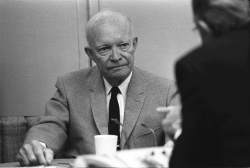 Meeting with General Dwight Eisenhower and other advisors aboard Air Force One
Meeting with General Dwight Eisenhower and other advisors aboard Air Force Onecredit: Yoichi Okamoto
On this day in 1965, President Johnson had a telephone conversation with former President Dwight D. Eisenhower. In the conversation, Eisenhower praised LBJ’s Johns Hopkins speech on Asian development and discussed the need for a new Asian organization. Eisenhower also suggested that the United States study ways to improve support by the Vietnamese populace of the South Vietnamese government. LBJ talked about foreign reaction to the Johns Hopkins speech.
April 9th
On this day in 1965, President Johnson had a telephone conversation with Undersecretary of State George Ball. Ball told LBJ he would meet with Cyrus Vance and Earle Wheeler to analyze facts about a U. S. airplane that was downed over Hainan Island and would then recommend a response to China. LBJ expressed concern about the effect the incident would have on the Senate vote on the Education Bill.
On this day in 1965, President Johnson issued Proclamation 3652: United Nations Day, 1965. LBJ stated,
“Now, therefore, I, Lyndon B. Johnson, President of the United States of America, do hereby proclaim Sunday, October 24, 1965, as United Nations Day and urge the citizens of this Nation to observe that day by means of community programs which will contribute to a realistic understanding of the aims, problems, and achievements of the United Nations and its associated organizations.”
On this day in April 1964, President Johnson met with Prime Minister Ch’oi Tu-son of Korea at the White House.
April 10th
On this day in 1968, President Johnson issued a statement after Congress passed the Civil Rights Act of 1968.
“This is a victory for every American, because the only true path to progress for a free people is the one we will take when this legislation is made the law of the land. Through the process of law, we shall strike for all time the shackles of an old injustice.
“A few years ago when we met here in the White House and discussed open housing and how to handle it by regulation or statute, there were very few who thought that in our time we could bring this justice to all Americans, but the Congress today has shown that, if we have the will, there is a way.”
On this day in 1964, President Johnson had a telephone conversation with Undersecretary for Political Affairs, Ralph Dungan. The two men discussed several subjects including LBJ’s evaluation of Congressman Adam Clayton Powell.
On this day in 1965, President Johnson issued Proclamation 3653: Senior Citizens Month, 1965. LBJ stated,
“Now, therefore, I, Lyndon B. Johnson, President of the United States of America, do hereby designate the month of May 1965 as Senior Citizens Month; and I urge all Federal, State, and local governmental agencies, as well as all public and private organizations and all citizens, to give effective expression to the theme of this special month: Meeting the Challenge of Aging Through Community Action for Older Americans.
“It is necessary, desirable, rewarding, and satisfying to help transform into realities the dreams that we have for our fathers, our mothers, and our other aging citizens. Let us make this month outstanding by giving our full support to the common efforts of public and private agencies at the Federal, State, and local levels that are working together to improve the added years which our civilization has made possible for so many of our citizens.”
On this day in 1968, President Johnson met with Chancellor Josef Klaus of Austria at the White House. That evening, Van Cliburn, pianist, performed at a state dinner.
April 11th
On this day in 1965, President Johnson signed the Elementary and Secondary Act [ESEA] (PL 89-10) at the former Junction Elementary School in Stonewall, Texas. Sitting beside him is his first teacher, Mrs. Kathryn Deadrich Loney. This was the first general aid-to-education program ever adopted by Congress and it provided programs to help educate disadvantaged children in city slums and rural areas. (ESEA was technically an amendment to a 1950 “impacted area” act and was amended in 1965, ’66, ’67, and ’70.)
On this day in 1968, President Johnson signed the Civil Rights Act of 1968. This act was designed to end racial discrimination in the sale and rental of 80% of U.S. homes and apartments. It also gave federal protection to civil rights workers.
“In the Civil Rights Act of 1964, we affirmed through law that men equal under God are also equal when they seek a job, when they go to get a meal in a restaurant, or when they seek lodging for the night in any State in the Union. Now the Negro families no longer suffer the humiliation of being turned away because of their race.
“In the Civil Rights Act of 1965, we affirmed through law for every citizen in this land the most basic right of democracy—the right of a citizen to vote in an election in his country. In the five States where the Act had its greater impact, Negro voter registration has already more than doubled. Now, with this bill, the voice of justice speaks again.
“It proclaims that fair housing for all—all human beings who live in this country—is now a part of the American way of life.
“We all know that the roots of injustice run deep. But violence cannot redress a solitary wrong, or remedy a single unfairness.
“Of course, all America is outraged at the assassination of an outstanding Negro leader who was at that meeting that afternoon in the White House in 1966. And America is also outraged at the looting and the burning that defiles our democracy.
“We just must put our shoulders together and put a stop to both. The time is here. Action must be now.
“So, I would appeal to my fellow Americans by saying, the only real road to progress for free people is through the process of law and that is the road that America will travel.
“I urge the Congress to enact the measures for social justice that I have recommended in some twenty messages. These messages went to the Congress in January and February of this year. They broke a precedent by being completed and delivered and read and printed. These measures provide more than $78 billion that I have urged the Congress to enact for major domestic programs for all Americans in the fiscal 1969 budget.
“This afternoon, as we gather here in this historic room in the White House, I think we can all take some heart that democracy’s work is being done. In the Civil Rights Act of 1968 America does move forward and the bell of freedom rings out a little louder.”
On this day in 1967, President Johnson met with Latin American leaders at a summit in Punta del Este, Uruguay.
On this day in 1964, David Bean, pianist, performed at a White House Tea for the 9th and 10th grade classes of the National Cathedral School, attended by Luci Baines Johnson.
April 12th
On this day in 1967, President Lyndon Johnson and Secretary of State Dean Rusk conferred at the meeting of the American Chiefs of State at Punta Del Este, Uruguay. Then, the President signed S.J. Res. 65, which had been specifically flown from Washington so the President’s signature could be affixed, an executive order creating an emergency board to investigate the disputes between the Long Island Railroad and certain of its employees.
April 13th
On this day in 1967, President Lyndon Johnson addressed the conference of American Chiefs of State held at Punta Del Este, Uruguay.
April 14th
On this day in 1967, President Johnson and other Presidents in Latin America met to sign the Declaration of the Presidents of America. In the declaration, the Presidents agreed to create and support a Latin American Common Market; to bind the nations of the hemisphere in transportation, power, and river development; to expand Latin American trade; to intensify the battle against illiteracy and disease; to modernize agriculture and education; and to avoid unnecessary military expenditures. Eighteen of the Presidents signed the proclamation.
On this day in 1964, President Johnson met with King Hussein I of Jordan in an official visit at the White House. That evening, the Dave Brubeck Quartet performed at a White House Dinner.
April 15th
On this day in 1966, President Johnson spoke at the dedication of the Abraham Lincoln Statue in Mexico City. The President spoke at 12:02 p.m. in Mexico City before a group of some 5,000 persons gathered at the Parque Polanco for the ceremony.
On this day in 1965, President Johnson met with Prime Minister Harold Wilson of the United Kingdom at the White House.
On this day in 1961, Vice-President Johnson traveled to Norfolk, Virginia, where Lynda Byrd Johnson was crowned Azalea Queen.
April 16th
On this day in 1968, President Johnson conferred in Honolulu with U.S. military commanders about the Vietnam War.
On this day in 1968, President Johnson met with President Chung Hee Park of Korea in Hawaii. The two leaders discussed the serious threat to the security of the Republic of Korea and to peace in East Asia resulting from the aggressive action of the North Korean communists during the previous eighteen months.
Aggressive acts included the attack on the presidential residence in South Korea and the seizure of the USS Pueblo in international waters. They also reviewed the situation in Vietnam where Korean and American forces were both fighting alongside South Vietnamese troops.
On this day in 1964, President Johnson announced at a Washington, D.C., news conference that the U.S. and Colombia had agreed to study the feasibility of a sea-level canal through Colombia.
April 17th
On this day in 1965, President Johnson issued a statement entitled, “Tragedy, Disappointment, and Progress in Viet-Nam.” The President read his statement to the press on the lawn of the LBJ Ranch.
“Our policy also remains the same: to strive for peace, but not to yield to aggression; to use what power we must, but no more than we need; to stay until independence is secure, but to leave when that independence is surely guaranteed.
“And let this also be clear: until that independence is guaranteed, there is no human power capable of forcing us from Viet-Nam.
“We will remain as long as is necessary, with the might that is required, whatever the risk and whatever the cost.
“We are told by some that there can be no peace and no hope for a better life unless we first surrender and abandon South Viet-Nam.
“This we will not do.”
On this day in 1964, President Johnson made remarks at the first meeting of the President’s Commission on Heart Disease, Cancer, and Stroke. LBJ stated,
“I have asked you to undertake these three objectives: first, to measure the full magnitude of the impact of these diseases upon the Nation; second, to evaluate our resources for acquiring new knowledge; third, to identify the obstacles which stand in the way of advancing knowledge and give us guidelines on overcoming those obstacles.
“To this group I do not think I need to tell you how vital this is. Unless we do better, two-thirds of all Americans now living will suffer or die from cancer, heart disease, or stroke. I expect you to do something about it. Five million Americans a year are struck down in the prime of life by heart attacks—often fatal. Every 2 minutes, cancer strikes a man or a woman or a child in this country. Every year, strokes leave 200,000 Americans dead and another 2 million incapacitated.”
April 18th
On this day in 1965, President Johnson wrote a letter to the Chairman, Atomic Energy Commission, in Response to Reports on Activities During 1964. In his letter, LBJ wrote,
Our capacity for achievement in atomic energy development never has been greater. The Commission has achieved a high degree of cooperation with private industry and the universities. The Congress, especially the Joint Committee on Atomic Energy, has effectively supported our nuclear program. This team in being—of government, industry, and the educational community-constitutes an unparalleled force for accomplishment. I look to the Commission to continue and further enhance these effective and harmonious relationships.
On this day in 1965, President Johnson wrote a letter on racial discrimination in the programs and operations of the Department of Agriculture. In his letter, LBJ wrote,
The Commission report pointed out some instances in which discrimination on the basis of race have been found to exist.
It seems to me that the steps the Department is taking are designed to correct these deficiencies. I note, however, that many of them depend upon reports and responses from various units of the Department, and I would appreciate it, therefore, if you could let me know what actual progress has been made as a result of the changes you have instituted. It seems to me that a report 60 days from now on the progress actually made would be helpful.
April 19th
On this day in 1966, President Johnson signed a Resolution supporting U.S. participation in food relief for India. LBJ stated,
“I have approved H.J. Res. 997, to support United States participation in relieving victims of hunger in India and to enhance India’s capacity to meet the nutritional needs of its people.
“It supports and endorses my recent offer to enlarge our food shipments to the people of India to help them avoid the suffering that would otherwise result from the worst drought in a century.
“India simply cannot sustain its 500 million people from its drought-stricken resources until the next major harvest in November.
…
“The joint resolution I approve today recognizes and contributes to this vision of where we are and where we must go.”
On this day in 1966, President Johnson made a statement on the First Privately Owned Facility for Reprocessing Fuel from Nuclear Power plants.
“This plant, owned by the Nuclear Fuel Services, Inc., is a noteworthy step in the development of a strong, self-supporting nuclear industry in the United States. It will provide facilities to process spent radioactive fuels discharged from nuclear power plants to recover the unburned fuel and other valuable material. The construction of this plant with private capital has reduced Government capital expenditures which might have been otherwise necessary. This represents a major step toward placing this important atomic energy operation in the private sector of our economy. It is a splendid example of Government-industry cooperation to bring the benefits of the peaceful atom to our country. It is another instance where the U.S. Government is following the sound policy of turning over to private industry a service for which industry has shown a competence and willingness to perform.”
On this day in 1967, President Johnson presented the National Teacher of the Year Award to Roger Tenney. LBJ stated,
“Sometimes people think that I am not doing a very good job of teaching now—that I ought to go back to the profession. But as a former teacher, I cannot think of anything that a teacher would cherish more than the recognition of his countrymen of his outstanding achievements as you have been recognized by this Look award.”
Mr. Tenney, music teacher and vocal music director at Owatonna Junior-Senior High School, Owatonna, Minn., was accompanied by the senior high school choir of 40 boys and 40 girls who sang at the ceremony.
The “Teacher of the Year” was chosen from a group of finalists selected by a screening committee of national educational leaders. The award was sponsored by Look magazine in cooperation with the Council of Chief State School Officers, an organization of State superintendents and commissioners of education.
On this day in 1967, President Johnson met with Prime Minister Holyoake of New Zealand during the SEATO Council Ministers conference.
April 20th
On this day in 1965, President Johnson issued a statement on the eve of the Senate’s consideration of the Voting Rights Bill.
“There can be no forgetting, however, that neither a Voting Rights Act nor any other single act will solve the civil rights problems of the Nation or insure equal justice and equal opportunity for our Negro citizens. Those goals can be achieved only as the result of individual understanding, of community responsibility, and of national good faith. We have, in past months, seen some splendid examples of such action.
“In the period preceding enactment of the Civil Rights Act of 1964, hundreds—and even thousands—of Southern businessmen undertook to comply with it voluntarily even though it was not yet law. That spirit of acceptance illustrated not only respect for law and human dignity; it also established the climate of order throughout the South which has been so important to the successful implementation of the 1964 act.
“Similarly, there have been encouraging reports in recent days of community responsibility in the South. One such report concerns the action by 22 Alabama business groups who advertised, both locally and nationally, their commitment toward improved communication between the races. Perhaps an even more interesting illustration is that offered by the leaders of the city of Selma. Although not party to the original advertisements, they decided, by overwhelming vote, to endorse them.
“Assuredly, racial problems will persist, not only in Alabama and not only in the South, but for this to happen in a city where group feelings have been so inflamed suggests, I think, that men of reason and men of good will can prevail in all parts of our country. There could be no more encouraging fact.”
On this day in 1965, President Johnson had a telephone conversation with Defense Secretary Robert McNamara.
Secretary McNamara called from Honolulu, Hawaii, where he’d been meeting regarding Vietnam strategy. He talked to the President about the meeting; the New York Times story on the meeting; possible Chinese intervention in Vietnam; the introduction of U. S. combat troops; the improved performance by South Vietnam; about McNamara’s concerns about the vulnerability of Bien Hoa, Danang; and the two men mentioned General Maxwell Taylor.
On this day in 1965, President Johnson met with Prime Minister Moro of Italy at the White House. That evening, Leontyne Price, soprano, performed at the White House Dinner.
On this day in 1964, President Johnson sent a message to the 73d Continental Congress of the Daughters of the American Revolution. LBJ wrote,
All of us who are dedicated to freedom—the people of this and other nations; men as well as women—owe a great debt to those early revolutionaries and patriots through whose efforts the democratic principles of liberty and equality for all were set forth so vibrantly in the Declaration of Independence and the Constitution.
It is with this belief that I challenge the members of the Daughters of the American Revolution to even greater service to your fellow Americans—to continuing your humanitarian efforts on behalf of underprivileged children—to helping win the war against poverty—to pursuing your constructive activities in the preservation of the historic landmarks and the sites of our revolutionary past.
April 21st
On this day in 1964, President Johnson addressed a group of Treasury Department officials on Equal Employment Opportunity. The address was made in the Rose Garden.
“What I want to know is ‘What have you done for me lately?’ I think it is pertinent to note that the qualified Negroes that you employed when this program was getting underway are now at that point in their career where they are ready to move into higher categories, specifically, GS-12 and above.
“This entire approach to equal opportunity in employment is as full of common sense as it is of equity. We cannot afford the luxury of depriving the Nation of manpower or brainpower. That is why the Federal Government must lead the way, and we must lead the way—by precept, by example, and by results—so that the rest of the employers in the large companies, in the other Government offices, in the bureaus throughout the land that hold up Treasury as an example, can see the evidence that equal employment opportunity is good for this Nation and beneficial to its future.
“As I said in Gettysburg several months ago, it was 100 years ago that Abraham Lincoln signed the Emancipation Proclamation. It was 100 years ago that Abraham Lincoln took the chains off the slaves. But he did not free the country of bigotry. Until education is unaware of race, until all employment in this country is blind to color, emancipation may be a proclamation, but it won’t be a fact. We will just be kidding people.
“So I appeal to you to come in here and help me do some more about it. I commend you for your cooperation. I compliment you for your achievement. I urge you to keep moving forward faster and onward and upward.
“The best way I know to leave you this morning is to ask you to please practice the Golden Rule: do unto others as you would have them do unto you. Put yourself in the position of someone that may have been born in a different part of the country from where you were born, who may have been born with a different color from what you were born, who may have been born of a different race or different religion than you were born with. Ask yourself how you would like to be treated if they were in your powerful position and you were in theirs, and then do unto them as you would have them do unto you. If you do that, I have no doubt about the results.”
On this day in 1964, President Johnson made remarks upon receiving a Citation from the Disciples of Christ Historical Society.
“As we meet here today, with two-thirds of the world’s masses teeming, most of them under 40 years of age, all of them grasping, seeking, and yearning for the things that we already have, most of them as determined and as dedicated as our revolutionary fathers were when they brought this Nation into existence, we must realize that unless we so plan and so act and so do, the days of our peace and our prosperity may truly be limited.
“I would say to you that I want to so much be deserving of what you have said. I want all of us to constantly bear in mind the Biblical injunction by the prophet Isaiah, ‘Come now, let us reason together,’ and also never get very far away from the Golden Rule where we can look at the other fellow as we would have him look at us, and do unto others as you would have them do unto you.
“You are always welcome in this house. I appreciate the work you have done. All I can say is that, with whatever talents, energies, and strengths I have, they will be devoted to making this a better world—not just now, but, hopefully, for three, four, and five generations to come.
“When I go to bed every night, I try to sum up the day’s activities, which have usually been long and arduous. I ask myself what did I do that day to help some child yet unborn or to be reflected in some generation yet to come. I try to measure my efforts and direct my work to the fields where we can do the greatest good for the greatest number, not only to just Americans, but human beings wherever they are.”
On this day in 1964, President Johnson made remarks to a group of Editors and Broadcasters Attending a National Conference on Foreign Policy. The remarks were made in the Rose Garden.
“We must help developing countries because our own welfare demands it. It takes no great gift of foresight to realize that unless there is progress and unless there is growing satisfaction of just desires, there will be discontent and there will be restlessness. The developing world would soon become a cauldron of violence and hatred and revolution without some assistance.
“How would you feel if you were a member of a family whose total income was less than $80 per year? Yet a majority of the people of the world have incomes of less than $80 a year. Under such conditions, communism, with its false and easy promises of a magic formula, might well be able to transform these popular desires into an instrument of revolution. That is why every American who is concerned about the future of his country must also be concerned about the future of Africa and Asia and our old friends in Latin America.
“No President who looks beyond the immediate problems which crowd his desk can fail to extend the hand and the heart of this country to those who are struggling elsewhere. We help these countries in many ways: through trade and raw materials and manufactures, with the Peace Corps now working in more than 40 of them, through programs of economic assistance, through the exchange of scholars and students and ideas.
“We know that we have much to gain from them. We know that we can learn from their cultures, from their arts, from their traditions, for many of them are as rich in spiritual treasure as they are poor in material goods. These are Government programs, but it is also important for cities and towns, for private organizations and private individuals, to become interested and involved in the affairs of the world.
“So, I hope you will make this one of your first orders of business when you return to your homes. You can do this in many ways.
“Your communities can establish direct contact with communities in other countries. You can arrange for exchange of visits. You can arrange for help to schools and hospitals in a similar community, in a sister country, in a developing land.
“You can try and establish scholarships to bring deserving students to your local college or to your local high school for education. You can arrange programs of study and discussion about the problems of these other countries that a good many of your folks have not read about or studied about. You can conduct exhibits or performances of the arts and music, folklore, of others.
“These are just a few examples of the multitude of possibilities which are open to those who are willing to assume a personal responsibility for America’s interest in the rest of the world. We must never forget that concern and sympathy are often as important as material assistance. This must not be a patronizing concern, but it must be the concern of equal for equal, the concern of brother for brother.
“As you all know from our own experience, people everywhere are as hungry for respect as they are hungry for bread. So, I hope you will explain this to your people, and, as leaders of local opinion, I hope you can begin to shape in your local communities a fruitful collaboration between your people and the peoples of the lands.
“You are a part of the world. You are going to live in it. There are societies in other lands that are now venturing to take the same step that your colonial forefathers took, your revolutionary forefathers took, when they brought into existence this, the most powerful of all nations.
“America’s great strength in world affairs is not in Washington. It rests on dedicated labor of private institutions. It rests on organizations and local governments. It rests on the leaders and molders of public opinion—of which you are a substantial part.
“If we can summon that strength to our relations with the developing world, then we will have a weapon which our adversaries cannot ever hope to match. Then, and only then, will all Americans be proudly joined in a great adventure which unites the highest of our national ideals and the most important of our national needs.
“If I could leave one hope and one wish with you, it would be as a result of your visit here and of your study and application of what you have learned in your discussions; that upon your return home you could put the spotlight of your own community on the spotlight of other communities in the world, and, somewhere out yonder, you could lend a helping hand to lift up and to lead a people who are not as fortunate as we are. I believe that that would give you and your community a satisfaction that will never come from a paycheck.
“I think that if you can provide that leadership, America will not only continue to be the leader of the world, but we will be justified in being the leader of the world.”
On this day in 1967, President Johnson wrote a memorandum on air pollution.
There are two areas toward which the Federal Government must turn its immediate attention. The first of these is air pollution control research and development.
…
The other area requiring attention is the consideration of economic incentives for pollution control and the determination of the economic effects of pollution control.
The Federal Government should not be asked to shoulder the entire burden of air pollution control research. I am asking Secretary Gardner, with your assistance, to develop a plan to encourage the coal, oil, and power industries—whose very life is vitally affected by the air pollution control problem—to contribute substantially towards those parts of the directed and targeted research which relate to the desulfurization or other means of utilizing fossil fuels in accordance with existing and potential control regulations. Together we have the resources and knowledge to insure the American people of a healthy environment.
April 22nd
On this day in 1964, President Johnson made remarks at the United States Pavilion, New York World's Fair.
“There is much to be proud of in this America which is shown in this pavilion, but what we want most to convey is the spirit of America which is always building, in which the present is always prologue to the future, in which the energy of free men never falters. And with God’s help and with your blessing we will continue to move forward to a world in which all men are equal, in which all peoples are prosperous, in which all human beings are free, and, finally, in which all of us can live at peace.”
On this day in 1964, President Johnson wrote a letter to the President of the Senate and to the Speaker of the House proposing additional aid for Alaska. In his letter, LBJ wrote,
The primary purpose of the bill is to amend section 44(a) of the Omnibus Act to authorize $22,500,000 for additional transitional grants to the State of Alaska until June 30, 1966. I believe that this form of assistance to the State is essential to help it overcome the results of the tragic earthquake of March 27.
On this day in 1964, President Johnson issued Proclamation 3584, National Maritime Day, 1964. LBJ said,
“Whereas the Congress, by a joint resolution approved May 20, 1933 (48 Stat. 73), designated May 22 as National Maritime Day, in commemoration of the departure from Savannah, Georgia, on May 22, 1819, of the S.S. Savannah on the first transoceanic voyage by any steamship, and requested the President to issue a proclamation annually calling for the observance of that day:
“Now, therefore, I, Lyndon B. Johnson, President of the United States of America, do hereby urge the citizens of the United States to honor our American Merchant Marine on Friday, May 22, 1964, by displaying the flag of the United States at their homes and other suitable places.
On this day in 1964, President Johnson issued Proclamation 3585, Prayer for Peace, Memorial Day, 1964. LBJ stated,
“Whereas for this purpose the Congress, in a joint resolution approved May 11, 1950 (64 Stat. 158), requested the President to issue a proclamation calling upon the people of the United States to observe each Memorial Day as a day of prayer for permanent peace:
“Now, therefore, I, Lyndon B. Johnson, President of the United States of America, do hereby designate Memorial Day, Saturday, May 30, 1964, as a day of prayer for permanent peace, and I call upon all the people of the Nation to invoke God’s blessing on those who have died in defense of our country and to pray for a world of law and order. I designate the hour beginning in each locality at eleven o’clock in the morning of that day as the time to unite in such prayer.”
April 23rd
On this day in 1965, President Johnson signed an Executive Order designating Vietnam and waters adjacent thereto as a combat zone for the purposes of section 112 of the Internal Revenue Code of 1954.
Pursuant to the authority vested in me by section 112 of the Internal Revenue Code of 1954, I hereby designate, for the purposes of that section, as an area in which Armed Forces of the United States are and have been engaged in combat: Vietnam, including the waters adjacent thereto within the following-described limits: From a point on the East Coast of Vietnam at the juncture of Vietnam with China southeastward to 21° N Lat., 108° 15' E Long.; thence southward to 18° N Lat., 108° 15' E Long.; thence southeastward to 17° 30' N Lat., 111° E Long.; thence southward to 11° N Lat., 111° E Long.; thence southwestward to 7° N Lat., 105° E Long.; thence westward to 7° N Lat., 103° E Long.; thence northward to 9° 30' N Lat., 103° E Long.; thence northeastward to 10° 15' N Lat., 104° 27' E Long.; thence northward to a point on the West Coast of Vietnam at the juncture of Vietnam with Cambodia.
The date of the commencing of combatant activities in such area is hereby designated as January 1, 1964.
April 24th
On this day in 1967, President Johnson sent a message to Soviet President Nikolai Viktorovich Podgorny on the death of Soviet Cosmonaut Vladimir Komarov.
THE DEATH of Vladimir Komarov is a tragedy in which all nations share. Like three American astronauts who lost their lives recently, this distinguished space pioneer died in the cause of science and in the eternal spirit of human adventure.
I extend the sympathy of the American people to his family and to the people of the Soviet Union.
According to press reports, Col. Vladimir Komarov, completing an orbital flight mission, was killed when his Soyuz I spacecraft became tangled in its parachute cords after reentering the earth’s atmosphere.
April 25th
On this day in 1967, President Johnson attended the funeral of West German Chancellor Konrad Adenauer.
On this day in 1968, President Johnson met with King Olav V of Norway at the White House. That evening, the City Center Joffrey Ballet and the United States Marine Band performed at a White House dinner.
On this day in 1966, President Johnson gave a special message to the Congress transmitting Reorganization Plan 3 of 1966: Public Health Service. LBJ stated,
“I propose a series of changes in the organization of the Public Health Service that will bring to all Americans a structure modern in design, more efficient in operation and better prepared to meet the great and growing needs of the future. Through such improvements we can achieve the full promise of the landmark health legislation enacted by the 89th Congress.”
April 26th
On this day in 1968, President made remarks in the Rose Garden at the swearing in of W. Marvin Watson as Postmaster General.
“The Postal Service is one office of the Government that touches the lives of all Americans every day. This year, I am told, the Post Office Department will handle 83 billion pieces of mail. The Post Office Department today has employed in it more than 700,000 people. Nine States have smaller populations than does the Post Office Department.
“Its annual budget is equal to the budgets of Michigan, New Jersey, Massachusetts, and Florida—all combined. A job that is this big needs a good manager and a good leader, and I think the best man whom I could find for that job has been selected.
“I have indicated on occasions in the past something about the respect that I have for Marvin Watson and I don’t think that he needs any assurances of how I feel about him—and I don't need any about how he feels about me. I think both of us know how you feel or you would not be here.
“I just want to observe, though, that he has served here in the White House for more than 3 years. I think he knows the weight of responsibility in Government. I think he knows the pressure for decision and the necessity for action. I have found him always cool in crisis, and we have had enough of them for me to test him. He has been constant in his service and his devotion and he has always been wise and frank in his counsel.
“I believe he is a man to match the demands of his new duty.”
April 27th
On this day in 1964, President Johnson met with Prime Minister Eric E. Williams of the Republic of Trinidad-Tobago at the White House.
On this day in 1966, President Johnson met with Prime Minister Jens Otto Krag of Denmark at the White House.
On this day in 1967, President Johnson made remarks at the Dedication of the Crossland Vocational Center, Camp Springs, Maryland. LBJ stated,
“And as we dedicate this great new center for vocational education, we also celebrate another step toward another important national goal: and that goal is that every young American shall obtain as much education as he wants and as much training as he can absorb and can use.
…
“Crossland Vocational Center, and others like it that are springing up throughout this Nation, are a forge which will shape the lives and the careers of our young people—and through these young people, we will build the America of the 21st century.
“As we approach the next century, every citizen who hopes to play a productive role in American society must have occupational training of a sort—whether he wants to be a brain surgeon, an airplane repairman, an X-ray technician, or an astronaut.”
April 28th
On this day in 1966, President Johnson sent the 1966 civil rights bill to Congress. He proposed legislation that would ban discrimination in the sale and renting of houses. This was his first civil rights proposal that concerned a national problem, rather than merely inequalities limited to southern states.
He also asked for legislation to end discrimination in the selection of federal and state juries and to empower the attorney general to initiate suits to force desegregation of public facilities.
On this day in 1961, in a memorandum, Vice-President Johnson, as chairman of the Space Council, answered President John F. Kennedy’s question,
“Do we have a chance of beating the Soviets by putting a laboratory in space, or by a trip around the moon, or by a rocket to land on the moon, or by a rocket to go to the moon and back with a man?”
In his response, the Vice-President said that, with respect to putting a multi-manned laboratory into space or manning a trip around the moon,
“With a strong effort the United States could conceivably be first in those accomplishments by 1966 or 1967.”
April 29th
On this day in 1967, President Johnson made a statement upon authorizing construction of a prototype Supersonic Transport Aircraft. LBJ said,
“The impact of the supersonic transport program will be felt well beyond our own shores. Jet aircraft have already brought the world closer to us. Commercial supersonic transports—traveling at 1800 miles an hour or even faster—will make South America and Africa next-door neighbors. Asia will be as close to us as Europe is today.
“Only by sustaining the highest levels of business-Government cooperation will we reach that stage of progress.”
On this day in 1964, President Johnson made remarks to a group of civil rights leaders. Those leaders were: Most Reverend Patrick A. O’Boyle, Archbishop of Washington and chairman of the Interreligious Committee on Racial Relations; the Reverend Eugene Carson Blake, stated clerk of the United Presbyterian Church in the U.S.A.; the Reverend B. Julian Smith, Bishop of the First Episcopal District of the Christian Methodist Episcopal Church, chairman and vice chairman, respectively, of the Commission on Religion and Race of the National Council of Churches; and Rabbi Uri Miller, president of the Synagogue Council of America.
“Our most immediate need is to pass the civil rights bill now before the Congress. A hundred years ago Lincoln freed the slaves of their chains, but he did not free the country of its bigotry. A hundred years ago Lincoln signed the Emancipation Proclamation, but until education is unaware of race, until employment is blind to color, emancipation will be a proclamation, but it will not be a fact.
“This bill is intended to help our communities find peaceful solutions to problems of human relations. Many of these communities have asked for the provisions in this bill so that the same standards can be applied to all businesses serving the public, and so the taxpayers can be given assurance that public funds will be administered equitably.”
On this day in 1968, President Johnson accepted an award from the International Narcotics Enforcement Officers Association. LBJ stated,
“We have to make certain that every young man and woman in America is fully alerted to the ruinous danger of drug addiction.
“We have to try to find new ways to salvage the lost life of the addict and bring him back into the community as a productive and healthy citizen.”
April 30th
On this day in 1968, President Johnson met with Roy Wilkins, Executive Director of the NAACP; Ambassador Averell Harriman; and Ernest Goldstein. Wilkins was Chairman of the U.S. Delegation to the United Nations Human Rights Conference in Tehran, Iran. The President received a report on the conference from Wilkins.
On this day in 1965, President Johnson had a telephone conversation with McGeorge Bundy. They discussed the timing and language of the President’s statement on the crisis in the Dominican Republic; the President complained about delays in drafting the statement and expressed concern about the situation; they discussed Wayne Morse’s speech; Bundy relayed former President Eisenhower’s views on the Dominican Republic situation; they discussed the OAS meeting.
On this day in 1964, President Johnson made remarks at a meeting of the President’s Committee on Employment of the Handicapped. LBJ stated,
“Today, I am issuing instructions to the heads of every Federal executive department and agency in this Government to show the Nation what can be done to make fuller use of the ability of handicapped Americans. Twenty-four departments and agencies have already signed agreements with the Civil Service Commission to use special appointing authority to hire the handicapped.
…
“I am convinced that it is morally right, that it is socially just, that it is economically sensible, that it is administratively feasible to open the door of employment opportunity to handicapped Americans.”
On this day in 1964, LBJ made remarks commemorating the 175th Anniversary of the Inauguration of George Washington.

